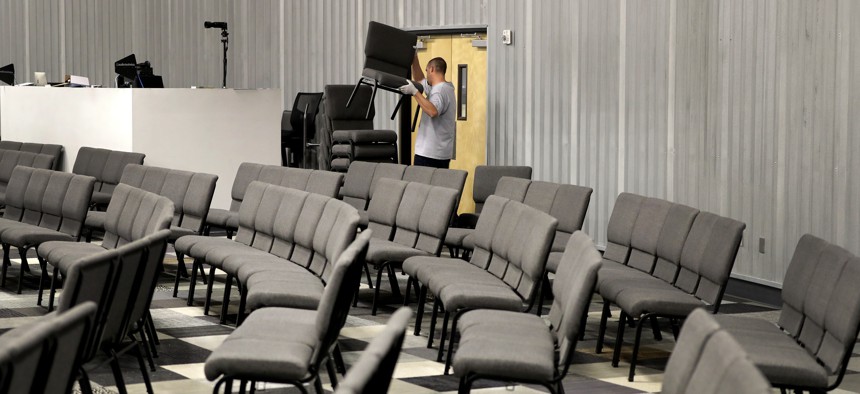The Dos and Don’ts of ‘Social Distancing’

Grace Bible Church facilities manager Kenny Sitton rearranges the seating for greater distance between seats on March 13, 2020, in Tempe, Ariz. after a state-wide conference call with Arizona Disease Control about preventing spread of Covid-19. AP Photo
Connecting state and local government leaders
Experts weigh in on whether you should cancel your dates, dinner parties, and gym sessions.
The Centers for Disease Control and Prevention has issued guidelines for “community mitigation strategies” to limit the spread of COVID-19, the disease caused by the coronavirus, which include recommendations for “social distancing”—a term that epidemiologists are using to refer to a conscious effort to reduce close contact between people and hopefully stymie community transmission of the virus.
But what exactly does “social distancing” look like for a woman trying to go about her life while staying healthy and helping keep the people around her healthy? Even detailed instructions are difficult to sift for actionable advice. If I have a fourth date tonight, do I go? If I’m invited to a wedding in two weeks in another state, is it too late to cancel? If we’re on lockdown, and I live alone, can I walk to my friend’s apartment when I feel sad? If I end up officially quarantined, can I walk around the park at night for some fresh air?
The CDC guidelines acknowledge factors like the size of a community, its population density, its access to health care, and caveats that social-distancing measures can “be scaled up or down depending on the evolving local situation.” There are conflicting messages coming from media and people’s peers: On Reddit, young people are signing a “self-quarantine manifesto” while, at a press conference, the mayor of New York City is telling people to continue visiting bars and restaurants as normal, to protect the local economy.
So I took my personal questions to a series of public-health experts. “I think it’s a hard time because many of the recommendations we’re making are about increasing the distance between people, but of course, being close to people is what makes life a pleasure,” Carolyn Cannuscio, the director of research at the Center for Public Health Initiatives at the University of Pennsylvania said in a phone call. “So this is going to be a very difficult time. No question.”
If you’re confused about what to do right now, you’re not alone—even these experts occasionally disagreed on the answers to my questions. Where there were discrepancies, I’ve included all the different answers as fully as possible. This guide is aimed toward those who are symptom-free and not part of an at-risk group, with an addendum at the end for those in quarantine. If you are symptom-free but are over 60 years old; have asthma, heart disease, or diabetes; or are otherwise at risk, experts recommend defaulting to the most conservative response to each of these questions.
There is a general consensus that while young and healthy people who are at lower risk for personally suffering severe illness from the coronavirus don’t have to be locking themselves in their homes for the next month, they do need to dramatically alter their daily lives, starting now.
If I’m Symptom-Free:
Cannuscio: People should avoid gathering in public places. People should be at home as much as possible. The measures that have worked to get transmission under control or at least to bend the curve, in China and South Korea, have been extreme measures to increase social distancing.
Crystal Watson, a senior scholar at the Johns Hopkins Center for Health Security: It depends on local context. If we’re in a situation where the disease has been shown to be spreading widely, I think people will start to want to stay home and not go out into crowded settings.
Albert Ko, the chair of the epidemiology department at the Yale School of Public Health: If you go to a crowded bar where you’re up one against another, that’s a lot different from going to a bar where you’re spread out. The CDC recommendations are to keep six to 10 feet away from other people. Bottom line, there’s no absolute indication not to go to bars and restaurants, but in practicing good public health—which is kind of a responsibility for everybody in the country—really think about how we can decrease those close contacts.
CAN I HAVE A SMALL GROUP OF FRIENDS OVER TO MY HOUSE FOR A DINNER PARTY OR A BOARD-GAME NIGHT?
Watson: I think small gatherings are probably okay as long as nobody has symptoms, respiratory symptoms. As soon as someone seems sick, you should probably not get together.
Ko: We’re in a gray zone now. The public-health imperative is to create social distance; that’s the only way we’re going to stop this. Think about having those get-togethers but practicing good public health: not sitting very close, trying to keep distance. Wash your hands; avoid touching your face. There are places on the board game that people are constantly touching—routinely disinfect [those, as well as] doorknobs, the bathroom faucets, those types of things. There’s no absolute rule about what works, but what we do know is that decreasing the size of those gatherings, increasing the distance, practicing good hygiene will go a long way.
Cannuscio: I would recommend that people minimize social contact, and that means limiting all social engagements. That includes intimate gatherings among friends. I think the exception is if two households are in strict agreement that they are also going to reduce all outside contact and then those two households socialize together, to support one another. I can see social and mental-health advantages to that kind of approach.
SHOULD I STOP DATING?
Ko: Dating is usually one person and another person. What we’re really worried about in terms of public health are these large gatherings where you have people crowded together, and you can have what we call super-spreading events. The risk of those goes up exponentially the larger the size of the gathering. Dating is at the other end. I think you can still date.
Watson: I think dating is okay, if you believe with reasonable confidence that you’re both well. I think we’re humans and we need human interaction; I think that’s important for our sanity. It’s important to focus on [avoiding] large crowds and indoor activities where you have lots of people touching the same surfaces.
Cannuscio: It is a time to be very cautious about initiating contact with new people. This seems like a great time to get creative with your text messages. [Or] take it to FaceTime or a phone call.
CAN I GO TO THE GYM?
Ko: If you do go to the gym, again, maintain distances. Disinfect places in the gym people are always touching. Wash your hands regularly. Much of the transmission is person to person with people coughing, sneezing, or touching their nose and mouth and touching somebody else. You can get transmission on surfaces; that’s probably a little bit lower-risk, but we still should disinfect surfaces that we touch.
Cannuscio: If you’re going to go to the gym, try to go at a time when there are very few people there and definitely wipe down the equipment. However, as the weather warms in many parts of the United States, I would instead recommend that people go outside for walks or runs or bike rides in areas where there are not other people. This is really about depriving the virus the opportunity to move from one person to another.
SHOULD I BE WORRIED ABOUT GOING TO THE GROCERY STORE?
Cannuscio: I would say try to shop at times when there are very few other shoppers there. That [could mean] going first thing in the morning when the store opens, or late at night. I think many people will rely on delivery, and that’s just the nature of our lives right now. For delivery workers, I would say, leave the food on the doorstep and ring the bell, rather than interacting face-to-face with the person who’s ordered the food.
SHOULD I TAKE PUBLIC TRANSPORTATION?
Cannuscio: First of all, people who have the opportunity or the option of working at home should absolutely use that option right now. For people who have essential functions and have to be at work, if they have any flexibility in their schedules they should try to ride at non-peak hours. On subways or buses, people should try to stand as far away from other people as possible. I think it’s important for planners to think about, for example, putting more buses on the most heavily traveled routes, to maybe thin out the crowds on those buses. In cities where it’s possible to walk, that would be a better option.
For people who can afford to use ride-sharing services, you’re limiting the number of people you’re in contact with as the rider, so to me that seems like a reasonable step to take. Of course, I worry about all those drivers who have people in and out of their cars all day long.
And of course, everyone should be using good hand hygiene and respiratory etiquette. If you have to cough, cough into your elbow. And I can’t believe I have to say this, but I’ve been in public places where people have been spitting, in parks or on the sidewalk. I would ask people not to spit!
Watson: It’s hard to say “Don’t take public transit,” because a lot of people rely on it to get to work. If you don’t have to and you can drive, it’s probably a good idea. It will help other people who have to take public transit for their livelihoods to do so and do so more safely.
SHOULD MY FAMILY BE CANCELING EVENTS LIKE BIRTHDAY PARTIES AND WEDDINGS?
Watson: It’s hard to ask everyone if they’re feeling sick and harder to know what their exposures have been. I would take a look at who is invited to the party. Are there people who are very vulnerable? Older people, people who have underlying health conditions, pregnant women? If that’s the case, I would err on the side of caution. I don’t want to tell somebody to cancel their wedding. That would be terrible. But I think you have to look at the situation, maybe ask guests who are feeling ill not to come. If it’s being held in a community where there’s widespread disease, then it might be worth [reconsidering the event].
Ko: If those events can be postponed, I think that’s certainly productive. If a wedding can’t be postponed, there are things you can do. Hold it in an open space, where people are spread apart. You have to be really careful about exposures and really practice social distancing from the elderly.
Cannuscio: One of the best ways we can show love to the people we care about is to step back and to stay away. In many cases that takes courage, and it takes speaking out over these social norms that dictate that we should be polite and we should be together and we should celebrate and gather. Really seriously consider whether now is a joyful time to gather family members for a wedding celebration.
Kaitlyn Tiffany is a staff writer at The Atlantic, where she covers technology.

NEXT STORY: Louisiana to Delay Presidential Primaries Due to Coronavirus Concerns








